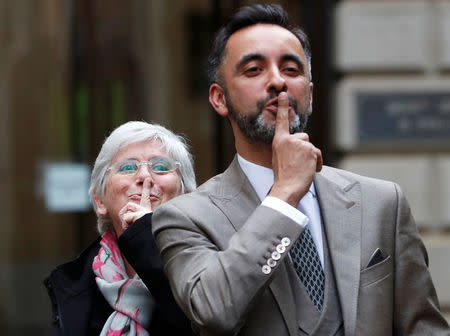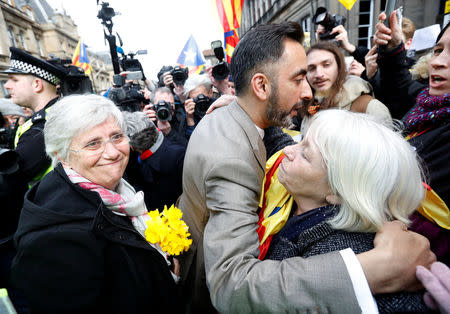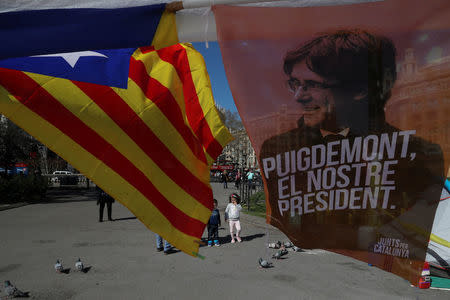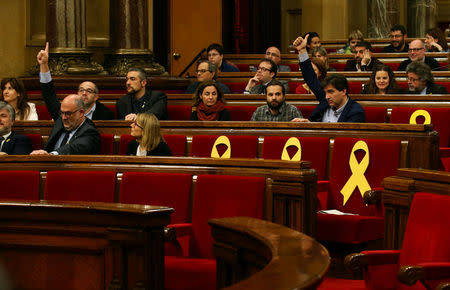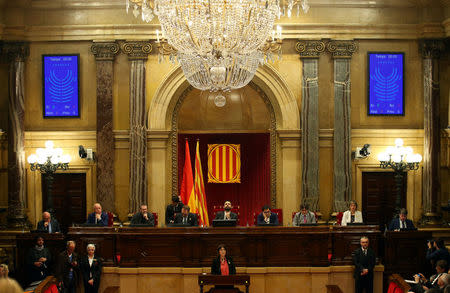Defiant Catalan academic Ponsati granted bail in fight to avoid Spanish extradition
By Russell Cheyne and Inmaculada Sanz EDINBURGH/MADRID (Reuters) - Catalan academic Clara Ponsati, accused by Spain of rebellion for her role in Catalonia's independence campaign, was granted bail by a Scottish court on Wednesday as she battles extradition, saying she was the object of political persecution. Ponsati, a former Catalan education minister who is currently a professor at Scotland's University of St Andrews, is one of the Catalan leaders being sought by the Spanish courts for organising a referendum on independence in October last year that was deemed illegal under Spanish law. Also among them is the former head of the regional government, Carles Puigdemont, who has been detained in Germany. In a symbolic gesture of support, Catalonia's parliament on Wednesday said it backed his right to again lead the region. As Ponsati handed herself in at a Scottish police station to face charges which also include one of misuse of public funds over the banned independence vote, her lawyer said Ponsati believed she would not get a fair trial in Spain. "Clara remains defiant, resolute and is determined to fight back," her lawyer Aamer Anwar said. "She does not believe that the Spanish courts can guarantee independence, human rights or justice." NO GUARANTEE He read a statement which also thanked Scotland's first minister Nicola Sturgeon, herself a supporter of independence for Scotland from the United Kingdom, saying Scotland had been "a true friend to Catalonia in her darkest hours". Ponsati was later freed on bail at Edinburgh Sheriff Court, leaving to cheers from a throng of supporters outside waving the "estelada" Catalan independence flag. "Clara wishes for me to state that these charges are politically motivated and a grotesque distortion of the truth. She cannot believe that she is being held responsible for the violence that took place on the day of the referendum," Anwar said outside court. "She believes ... the only people that should be held responsible for the brutal violence (are) the Spanish police and the 6,000 state security forces who attacked the Catalan people on behalf of the Spanish government." Ponsati's next hearing was set for April 12. A crowdfunding page set up to pay her legal costs has already raised 165,000 pounds ($232,600). The Spanish government denies it is prosecuting the Catalan separatists for their political beliefs and says their actions violated the Spanish constitution. A Spanish justice ministry official was not available to comment on the latest development. Those facing charges of rebellion could be jailed for up to 25 years if convicted. Following the banned referendum in October and a subsequent declaration of independence by the Catalan parliament, Spanish Prime Minister Mariano Rajoy dismissed the assembly and took direct control of the rich northwestern region. The political crisis is one of Spain's most serious since the country returned to democracy in the 1970s. Puigdemont, who has been living in self-imposed exile in Belgium, was arrested in Germany on Sunday, sparking protests on Barcelona's streets. He is being held in prison pending an extradition hearing in a German court. Wolfgang Schomburg, a German attorney representing Puigdemont, urged the Berlin German government to immediately make clear it would not under any circumstances approve his extradition. He told the Sueddeutsche Zeitung that the Spanish arrest warrant for Puigdemont was imprecise and superficial and it was unclear whether it was a European or international warrant. He said the charges of violence and corruption mentioned in the warrant were unsupported. Spanish national police said on Wednesday that two Catalan regional officers who were travelling with him had also been arrested. The detentions formed part of an investigation into a crime of concealment, police said on Twitter. Despite his detention, the separatist-controlled Catalan parliament on Wednesday defended Puigdemont's right to be a candidate again to head the regional government. The declaration had the support of separatist parties Junts per Catalunya, Esquerra Republicana and the CUP, who together won a slim majority of votes in a December regional election. Spain's Constitutional Court has said that Puigdemont or any other candidate could only become regional leader if he was physically present in parliament and had a judge's permission to attend. "The Spanish justice system's interference has forced him (Puigdemont) to provisionally renounce his candidacy but we will not give up," Gemma Geis, regional parliament member of Junts per Catalunya, said. ($1 = 0.7094 pounds) (Additional reporting by Emma Pinedo and Jesus Aguado in Madrid and Andrea Shalal in Berlin; Writing by Elisabeth O'Leary and Michael Holden; Editing by Catherine Evans and Richard Balmforth)
